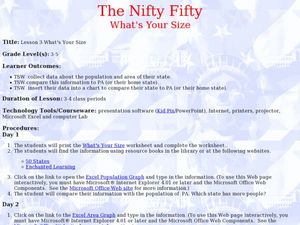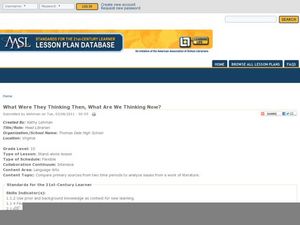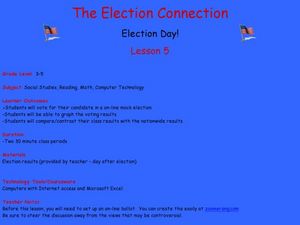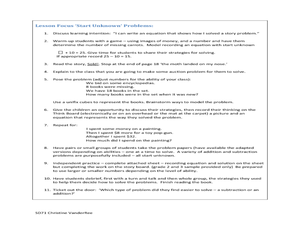Curated OER
Gingerbread Baby v. Gingerbread Boy #7
Students compare and contrast the gingerbread baby in their story to the original gingerbread boy. They use a Venn diagram to easily see the similarities and differences.
Curated OER
Comparing North American Colonies Vs. Britain
Fifth graders practice creative writing by describing events from the Colonial era. In this U.S. History instructional activity, 5th graders identify King George III and George Washington, the roles they played, and the...
Curated OER
Identifying Disease Genes using BLAST
Students navigate the National Center for Biological Information (NCBI) website and BLAST program to conduct a variety of biological assignments.
Curated OER
Out of the Dust: Questioning Strategies
Bloom's Taxonomy is a great way to address the many levels of comprehension. With explanations and examples of each level, you can create questions that focus on knowledge, comprehension, application, analysis, synthesis, and evaluation.
Curated OER
Picasso; Comparing Blue and Rose Periods
Third graders research Picasso's art career. They use a word processor to create a Venn diagram which compares Picasso's Blue and Rose Periods.
Curated OER
Modified Orienteering
Students participate in activities using compass settings. They find north and notate the bearings of objects that have been set up in the school yard. They find marks that both visible and hidden behind and under things like trees, and...
Curated OER
Moving West with the Forts: Using an Interactive Map
Seventh graders practice reading maps and locating the forts stationed in Texas. Using the internet, they analyze westward movements from statehood to the Civil War. In groups, they complete a worksheet about the forts and share their...
Curated OER
Mammal Morphology - Bats, People, and Other
In this physical characteristics worksheet, students compare bats and humans by putting a + sign in the chart for whether or not bats and humans have the same characteristics. Students do this for 17 characteristics and answer 3 questions.
Curated OER
Northwest Hawaiian Islands
Students compare and contrast places around the world. Students analyze the effects of human activity on the physical environment and devise plans to address the consequences. Students also focus on geographical topics such as formation...
Curated OER
The Nifty Fifty-What's Your Size?
Students explore state populations. In this state geography lesson, students use a variety of technology tools to research and graph population and area of assigned states.
Curated OER
What Were They Thinking Then, What Are We Thinking Now?
Choosing an issue from a play or novel, researchers find two primary sources from different time periods to compare how people's views have changed. Many questions are listed to guide young writers. In the end, learners produce a...
Curated OER
The Election Connection
Students participate in a mock election. In this election lesson plan, students vote online in a mock election, graph the results, and compare their results to the nationwide results.
Curated OER
Symmetry Worksheet IV
Challenge your class to identify, label, and draw a wide range of symmetries with this worksheet. In addition, learners name symmetrical shapes and compare them to alphabet letters. This worksheet asks class members to work with lines of...
Curated OER
Gingerbread Baby's Point of View #8
Read the story Gingerbread Baby and use these various activities to connect to grammar, art, and point of view. In one activity, learners create character masks. They practice writing verbs on the back of the masks to tell what each...
Curated OER
Race and Ethnicity in the United States
Students explore race and ethnicity as it is defined by the U. S. Census Bureau. They compare data from 1900, 1950, and 2000 and identify settlement patterns and changes in population. In groups, they map these changes and discuss...
Curated OER
Observing the Growth of a Maize Root
Students conduct an experiment in order to observe the typical downward growth of a maize root. They become familiar with the root's growth patterns to use as a control for comparison in other experiments.
Curated OER
Solve Story Problems: Sold! A Mathematics Adventure
Young mathematicians listen to the book Sold!: A Mathematics Adventure by Nathan Zimelman where they encounter ways to solve story problems. They then create and solve start unknown addition and subtraction equations. Resource builds in...
National Center for Case Study Teaching in Science
Bad Fish, Bad Bird
In an advanced biology lesson, learners see a PowerPoint about biologist Dr. Westwood, a two-time victim of poisoning. Designed to be used with clickers in the classroom, you could modify the lesson by creating a worksheet from the...
Intel
Metric Madness
Scholars learn about the metric system and produce a presentation on how to convert within the metric system. They then develop a brochure in support of legislation requiring the use of the metric system.
Curated OER
Seven Steps for Writing an Academic Essay
Students brainstorm ideas for a teacher selected writing topic. They demonstrate seven steps for writing an academic essay. They jot down words or phrases using different colored pens. They write a thesis statement and create an outline...
Curated OER
Spanish Sentence Structure
Instruct your class on how to put together a sentence in Spanish. The resource covers the different parts of speech, showing how the Spanish version of each sentence compares with the English version. While there are no procedures...
Curated OER
Teaching with Poster Art: World War I Posters
Students interpret historical evidence presented in primary resources. In this World War I lesson, students examine World War I posters. Students investigate the use of propaganda strategies in the posters and discuss the visual metaphors.
Curated OER
Sunspot Classification
Young scholars study classification schemes for identifying sunspots. They distinguish between sunspot unbrae and penunbrae, measure sunspots, and compare them to the size of the Earth. They complete a worksheet showing classification of...
Science 4 Inquiry
Maintaining Mass
Can you disprove the law of conservation of mass? Pupils observe the teacher weigh each part of a reaction. Then, the teacher weighs the result of the reaction and everyone sees that the products do not equal the reactants. Then they...

























